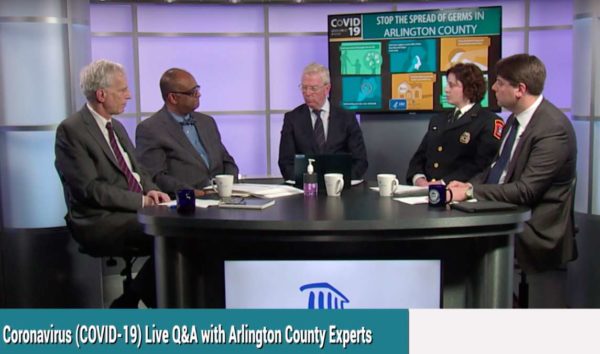There are confirmed cases of coronavirus on the East Coast, so Arlington County assembled some local experts to talk about what the county is doing to prepare for a potential outbreak while clearing up some misconceptions about the disease.
A number of county officials fielded questions sent via social media during Wednesday night’s online panel discussion. Dr. Reuben Varghese, the Arlington County Director of Public Health, answered the lion’s share of the questions as he told locals what to do, and what not to do, to prevent the spread of the disease.
Varghese, like health officials across the country, said the most effective way of keeping yourself safe is by frequently washing your hands, scrubbing for at least 20 seconds at a time.
“The tried and true [advice] for public health activities is to wash your hands with soap and water,” Varghese said. “Don’t touch mouth, nose, eyes. Those are portals for how germs get into body. Cover your cough with elbow and tissue.
Varghese said hand sanitizer can be handy in a pinch, but warned that it isn’t a replacement for thorough handwashing. Any soap will do, Varghese said, noting that antibacterial soap and regular soap make no difference here since the disease is not bacterial.
“Whenever you enter a building, wash your hands,” Varghese said. “When you get home, wash your hands.”
Some asked why the focus on stopping a respiratory virus was on hands and not breathing, but Varghese said that’s a common misconception with diseases like this.
“It’s not always through respiratory contact that you get spread of germs,” Varghese said. “Unless you’re routinely in very close proximity with someone, the most common way of transferring respiratory illness is disease on hands touching [your] mouth, nose or eyes — which then get into the system and cause respiratory illness.”
Varghese also said Arlingtonians shouldn’t be too worried about the spread of coronavirus through apartment complex air systems.
“Whether it’s a high rise or home, [spread of the virus] is all about how air handling is done in these facilities,” Varghese said. “As far as I know, the vast majority have very good air handling in the high rise buildings so it should not lead to spread within these areas.”
Other panelists said now is a good time to take stock of emergency supplies.
“The time to prepare is before emergencies,” said Aaron Miller, director of Arlington’s emergency management department. “In these stages, where we’re still monitoring [the outbreak], take this opportunity to relook at your kit. Look at the food, water, medications.”
Miller said businesses should have a plan for continuity of operations in case of emergencies, referring them to guidance from the CDC.
For those with plans to travel, Miller also advised referring to the CDC travel advisories. In general, Varghese said travel should be limited to absolute necessity.
“People need to be smart, in general,” Varghese said. “Ask the question: is the travel essential? We’ll leave it to you to decide what’s essential.”
Regarding the schools, County Manager Mark Schwartz said decisions to close in the event of a local outbreak would be made on a case-by-case basis.
“We’re in constant communication with the schools,” Schwartz said. “As far as decisions for closing classrooms or schools, I can’t say ‘this should happen’ or ‘that should happen.'”
“If your kid is sick, the best thing you can do is keep that child at home with you,” Schwartz added.
The Q&A session (a video replay is below) would likely be the first of several chats in the coming weeks, said Schwartz.


